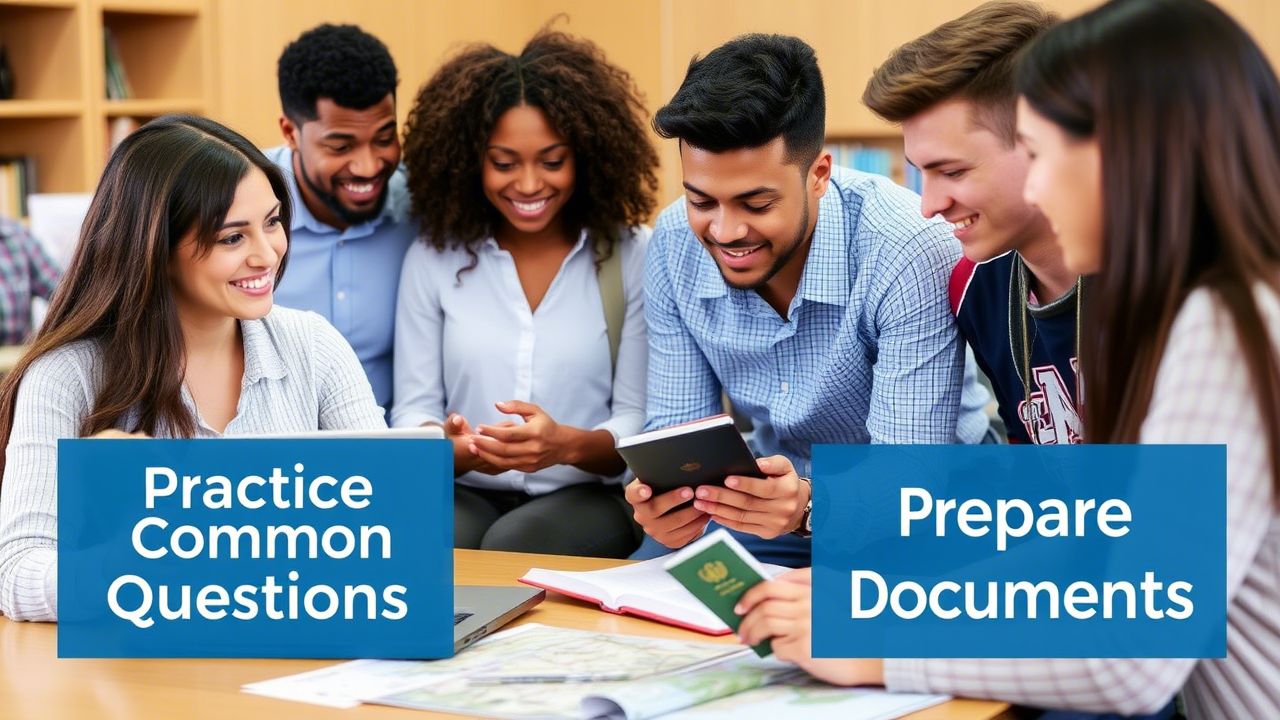Securing a student visa is a crucial step in your journey to studying abroad. For many students, the visa interview is the most nerve-wracking part of the process. But with the right preparation, you can walk into your interview with confidence and walk out with an approval stamp. In this comprehensive guide, we’ll cover essential student visa interview tips and questions that will help you succeed in 2025 and beyond.
Why the Student Visa Interview Matters
Visa interviews are designed to assess whether you are a genuine student and whether you meet the country’s visa requirements. The interviewing officer wants to know:
- Why you chose a specific university and program
- How you plan to finance your education
- What your post-graduation plans are
- Whether you intend to return home after your studies
Your answers must be honest, confident, and well-prepared to leave a good impression.
Before the Interview: How to Prepare
Preparation is key. Here’s how to set yourself up for success:
1. Know Your Documents
Ensure all required documents are in order. These typically include:
- Passport (valid for at least six months beyond your stay)
- I-20 or acceptance letter
- Proof of financial support
- Academic transcripts and standardized test scores
- SEVIS fee receipt (for U.S. students)
- Visa appointment confirmation
Organize your documents in a folder and be ready to present them if requested.
2. Understand Your Program and University
You should know key facts about your chosen institution and course. Be prepared to explain:
- Why you chose this university
- How the program aligns with your career goals
- What makes this institution stand out
3. Practice Common Questions
Mock interviews can help reduce anxiety. Practice answering common questions with a friend, family member, or mentor.
4. Dress Professionally
First impressions matter. Dress neatly and conservatively to show you’re serious and respectful of the process.
Common Student Visa Interview Questions
Here are some frequently asked questions, along with tips for how to answer them:
1. Why do you want to study in [Country]?
Be specific about the education system, course quality, or future prospects that attracted you.
Example Answer: “I chose Canada because of its high-quality education system, multicultural environment, and the opportunity to gain practical experience through co-op programs.”
2. Why did you choose this university?
Mention the academic strengths, research opportunities, or course relevance to your goals.
Example Answer: “The data science program at XYZ University offers cutting-edge curriculum and industry partnerships, which aligns perfectly with my career aspirations.”
3. How will you finance your education?
Provide clear details about your funding source: scholarships, personal/family savings, education loans, etc.
Example Answer: “My parents will sponsor my education and I also received a 30% merit-based scholarship from the university.”
4. What are your plans after graduation?
Officers want to know you intend to return home, not stay illegally.
Example Answer: “After completing my degree, I plan to return to India to work in the tech sector and contribute to digital innovation in my country.”
5. Do you have relatives in [Country]?
Answer honestly. Having family is not a disqualifier, but always clarify your intent to return home.
6. Why not study in your home country?
Focus on how your chosen program or institution offers something that is not available locally.
7. What does your family do?
This helps the officer assess financial stability. Provide brief but clear information about your parents’ occupations.
8. Can you show me your financial documents?
Be ready to show proof of funds such as bank statements, sponsor letters, or loan approval letters.
Tips for a Successful Visa Interview
These practical tips can help you handle your interview like a pro:
1. Be Honest
Don’t try to guess the “right” answer. Interviewers are trained to detect dishonesty.
2. Speak Clearly and Confidently
Avoid mumbling or being overly rehearsed. Keep your tone friendly and natural.
3. Keep Answers Short and Relevant
Stick to the point. Long-winded answers can seem evasive.
4. Maintain Eye Contact
This shows confidence and sincerity. Don’t stare, but don’t avoid looking at the officer either.
5. Don’t Volunteer Extra Information
Answer only what is asked. Additional details can complicate your application.
6. Stay Calm Under Pressure
If you don’t know an answer, it’s okay to say you’re not sure. Just don’t panic or make up information.
What to Do If Your Visa Is Denied
If your visa is denied, don’t lose hope. Ask the officer for the reason and work on addressing that issue.
Common reasons for denial:
- Inadequate financial proof
- Lack of strong ties to home country
- Inconsistent answers
You can reapply after improving your application or addressing the concerns.
Real Student Experiences
Ravi from India (U.S. Visa): “I practiced with my sister for a week and focused on financial questions. The officer asked me about my father’s job and my study plans. I got approved in 3 minutes.”
Linda from Nigeria (UK Visa): “They asked why I chose my program and how I will pay. I was nervous but prepared everything in a folder. The officer smiled and said I did great.”
Final Thoughts
The student visa interview doesn’t have to be scary. With preparation, practice, and a positive attitude, you can increase your chances of approval significantly. Remember, the goal is to show that you’re a genuine student with a clear academic plan and strong ties to your home country.
Take the time to prepare your documents, understand your goals, and rehearse your answers. With these visa interview tips and questions in mind, you’re well on your way to achieving your dream of studying abroad.
